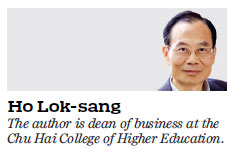Essential freedoms intact regardless of HKNP ban
Updated: 2018-07-24 08:07
(HK Edition)
|
|||||||
As opposition cries foul over plans to outlaw the openly separatist party, Ho Lok-sang notes central government has been reasonable in previous Basic Law interpretations
Last Saturday hundreds of protesters rallied against what they call "foul play" on the part of the government for seeking to ban the Hong Kong National Party over security concerns. The Civil Human Rights Front estimated 1,200 people had participated; police estimated about 600 joined the rally.
Rally participants included various "pro-democracy" groups such as the Democratic Party and Civic Party. Civic Party Chairman and former legislator Alan Leong Kah-kit said the government is just trying "to create favorable conditions for Basic Law Article 23 legislation". Indeed a prominent banner at the rally read: "Article 23 is Near; Hong Kong People Should Be on the Watch."
The purpose of this article is to dispel any fear that any of the essential freedoms that civilized societies today enjoy is under threat. If the proposed ban is unlawful it just cannot go ahead. If it is found lawful, this means it is consistent with the laws of the land including the Basic Law. What is there to fear?

Hong Kong's courts are independent. There have been several interpretations of the Basic Law since the handover but the National People's Congress Standing Committee has exercised this right with prudence and sparingly. On one occasion, related to the question of whether the Democratic Republic of Congo enjoys absolute diplomatic immunity in the special administrative region, the interpretation was actually in response to request from the Court of Final Appeal. On the occasion of the chief executive stepping down in the middle of a term, an authoritative NPCSC ruling was necessary to clarify if a CE elected midway should serve a full term or the remainder of the original term. On the occasion over the disqualification of legislators who had failed to make a solemn oath, the interpretation was entirely consistent with international practice anywhere. Can anyone find an example anywhere when "taking an oath" the way the disqualified legislators-elect did would be deemed acceptable? Indeed the justice at the Court of First Instance had commented that, with or without the NPCSC interpretation, the ruling would have been the same. Under the Oaths and Declarations Ordinance: "Any person who declines or neglects to take an oath duly requested which he is required to take by this Part, shall - if he has already entered on his office, vacate it, and if he has not entered on his office, be disqualified from entering on it."
That was the wording, and there is just no provision for anyone to have the discretion to waive the consequences. It is common sense that all oaths should be made solemnly; those made in the Legislative Council should be no exception.
As to the other interpretations of the Basic Law from the NPCSC, it was largely in the interests of Hong Kong that the NPCSC stepped in. For example, in the Ng Ka-ling and Chan Kam-nga cases in 1999, there was concern that going along with the Court of Final Appeal ruling to give all children born of permanent residents, regardless of when they were born, right of abode in Hong Kong would lead as many as 1.6 million mainland residents to immigrate to Hong Kong over 10 years. The NPCSC interpretation was made upon the SAR government's request, and was certainly not made in favor of Beijing against that of Hong Kong.
In 2016 the NPCSC, in its fifth interpretation of the Basic Law, spelled out in detail the requirements for a valid oath in LegCo. It is often held that this was responsible for the removal of six legislators-elect including Sixtus Leung Chung-hang and Yau Wai-ching, who displayed banners with the message "Hong Kong is Not China".
Thus there is no evidence whatsoever that Hong Kong's judicial independence was ever undermined through the 21 years of the SAR's history. Article 27 of the Basic Law says Hong Kong residents shall have freedom of speech, of the press and of publication; freedom of association, of assembly, of procession and of demonstration; and the right and freedom to form and join trade unions, and to strike. Given that these rights are explicitly spelled out in the Basic Law, Hong Kong people can trust that these rights will be preserved.
But then the demonstrators last Saturday say they are worried about Beijing tightening up on these freedoms.
I say: "Not to worry, as long as the exercise of the freedoms is consistent with the principle of 'one country,two systems'." But the preamble of the HKNP is inconsistent with the "one country, two systems". It says that Hong Kong today is a colony of China and wants to seek its separation from China. The HKNP is there to subvert the "one country, two systems".
Speech or societies that are compatible with the "one country, two systems" will certainly not be prosecuted. Seeking Hong Kong's independence is against Hong Kong's interests and against national interests. Law-abiding citizens of Hong Kong who want the "one country, two systems" framework to prevail should have no worry. The Basic Law is there to ensure all legitimate rights of free speech and free association will prevail.
(HK Edition 07/24/2018 page7)